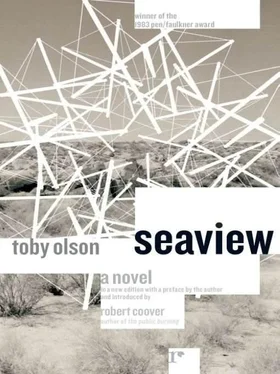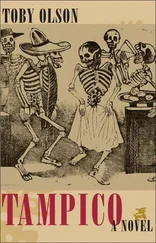ROBERT COOVER
Summer 2006
IT ’S BEEN TWENTY-FIVE YEARS SINCE SEAVIEW FIRST saw the light of day, published in 1982 by New Directions. It must have been a cloudy day, for the book received little attention in that year, though things did pick up a little in the next. I was younger then, but old enough to have written an earlier book called The Life of Jesus , something that pulled together a few short stories, a couple of poems, and a number of fragments, and seemed to become itself before I knew what was happening.
At least it felt that way. I’d been writing only poetry, and now I had this book with the word novel on its cover. I was curious about this other way of writing, and I thought I’d give it a conscious attempt next time. That’s how Seaview began, but that was just the beginning.
I’d been playing a lot of golf in the summers on Cape Cod since the mid-seventies, and I was feeling a little guilty about this. Summer was writing time, and I was wasting my time on the links. Golf is a sport that requires a number of skills, none of which I had mastered, but even more than with most sports these skills seem untranslatable, of no use at all in the “real” world.
If they could have translated, let’s say into yardwork, house repair, or even writing, the time wasted playing the sport might have been of some significant use, and I wouldn’t have felt guilty. Of course I could write about golf, about the possible translation of those skills, and about guilt, and that’s what I did.
Seaview is a real place (though with another name), a golf course near my house, and many of the characters in parts two and three of this novel are real people, though with names traded and changed. The book becomes in part a roman á clef on that golf course, a sweet one I hope. I’m heartened by the fact that even 25 years later fellow players come up to me insisting that they cannot be so-and-so in that book. They’re much better players than that!
And the guilt? It seemed enough to be writing about time wasted, to somehow redeem that time by turning it into something of value, a novel, any story, something to be shared with others for their pleasure.
There isn’t much pleasure in cancer, of course, though there is plenty of waste, and at the center of this book is the relationship between Melinda and Allen, she close to an ending, he trying to find ways to come to terms with her imminent death. It wasn’t the psychological difficulties that I was interested in here so much as the ways these difficulties were displayed in thought, behavior and communication. What did the relationship between these two look like, not what did it mean. From the beginning, I’ve felt that I don’t want to know my characters any better than I know people in my own life, which isn’t very well at all. I haven’t wanted to look too deeply into characters’ minds, have imagined thought as just below the surface of talk, not something of deeper significance, just another surface. For me this leads to the kind of realism I’m after. The way people behave and the way they think is endlessly fascinating, and I don’t want to intrude on that, to presume to understand it. I just want to describe and present it as best I can.
And this leads to the impossible belief that most everything of significance can be found on the surface and that the richness of this surface is invariably limited by explanation, be it psychological, biological, or any other theoretical approach. “The surface of the world where all beauty resides,” is what I’ve written in another novel, and less portentously, “not the tales /but the details” in a poem.
In Seaview I set out to illuminate the present in the face of nostalgia, regret, and impending death, trusting that the details of this present might go a long way toward capturing the significance of life lived in the here and now. What an impossible idea that now seems to be, but impossible or not, it proceeded from a certain single-minded passion. Maybe a residual of that passion remains in the sentences of this book.
TOBY OLSON
North Truro, Massachusetts
Summer 2006
HE NO LONGER WONDERED WHERE TO LAY DOWN BLAME or whose was the responsibility or what the responsibility was. Her body, finished with its rage, had settled in the cancer the way one slips into a tub in a dark bathroom, into hot water, and soon the skin is no longer a barrier, an integrity and definition; one becomes part of the water, the cancer. The skin goes in the way the breath does, out like a ripple of the surface of a still pool; part of a quota, it does not return. She lay in the tub, and under the water, crossing the rise of her belly, a place that was darker than water: a dark towel, taken from the blankets and pillows and towels in the backseat of the car, because it gave her some comfort. Her head rested on a rolled towel, placed where the tile and the porcelain met; chalk of the small hollow valley of her left cheek, her lips slightly parted, her shallow and stertorous breathing. The glass doors in the wall of the room beyond her were a field of light, reflection cast from the side of the rented car, up from the white gravel outside the motel room in Arizona. Occasional figures of yucca advanced, danced, and faded in the opaque field. He sat in a chair, in the dark in the side of the room, watching the gun.
The gun lay on the bed in the middle of a white towel.
She sighed in the distance. It was a small, blue-metal instrument with symmetrical indentations on its surface. He liked the romance of it, his privacy and her groggy sound. He reached out with a finger and touched the tip of the butt, better aligning the L — shape with the towel’s edge.
And then he thought of the two bags of cocaine, each pressed in a Diamond Kitchen matchbox that was taped shut, in the trunk of the car, under clubs, blankets, and clothing. He thought of the way Melinda would give it up, her body slipping as her quota of breaths left her: neck, chin, and upper lip, her nose blowing feeble air against the water’s surface (small indentations, minute waves), then going under. He lifted the gun up from the towel then and put the barrel between his teeth and pulled the trigger on the empty chamber.
“Melinda, are you okay in there?”
“Yes, I’m okay, honey, fine.”
He came back from the click as he had come back from the Tea Dream that time. In the Tea Dream, he was sitting on a bench to the side of the blue markers at the back of a narrow tee. The tee was long enough to accommodate all the markers, and from where he sat he could see the white ones halfway up, and near the foot of the tee, where it dropped off into rough and the slope started up to the high par-three green about a hundred and eighty yards away, the red, women’s markers, were set in. He had his cap and his glove on, and he was holding a seven-iron, the head resting in the grass to the side of his right foot. He looked from the club head, down the row of markers and up to the green. Beside the flagstick, gripping the shaft in her left hand, there was a woman standing in full view and facing down at him. She was wearing a white bathrobe, and she wore no jewelry.
Her hair was dark and uncombed, and she was holding hazy implements in her free hand at her waist. There was a smoky fog, a thick cloud that began coming up behind her, rolling over the green’s surface. It got to her, and her feet and legs were enveloped in the smoke, and he couldn’t see them clearly anymore. But he could see their changing bulks and her right foot rise a little and paw at the low, delicate carpet of grass.
Читать дальше












